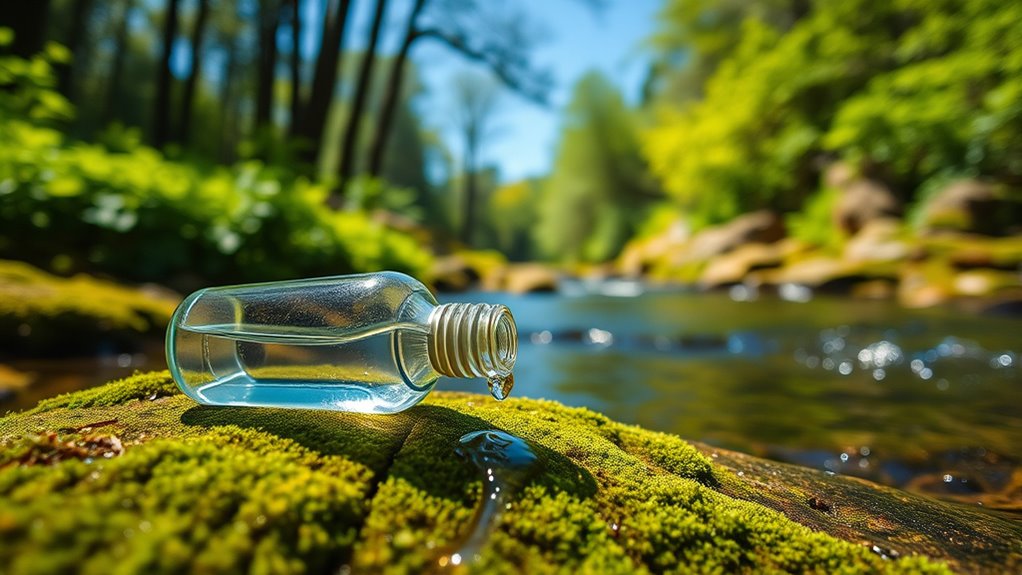Eco-friendly lubricants help reduce water pollution by breaking down quickly into harmless substances, minimizing risks to aquatic life. They are made from renewable plant-based oils and environmentally responsible sources, which lower the carbon footprint and reliance on finite resources. These lubricants are designed to be less toxic and more water-compatible, preventing contamination during spills or leaks. To learn how these innovations can protect our waterways, keep exploring the benefits of sustainable lubrication solutions.
Key Takeaways
- Eco-friendly lubricants biodegrade quickly, minimizing water pollution risks during spills or disposal.
- They are made from renewable, plant-based oils, reducing reliance on petroleum and lowering environmental impact.
- These lubricants are formulated to be less toxic and more compatible with aquatic ecosystems.
- They meet strict environmental safety standards, avoiding harmful chemicals like heavy metals.
- Their adoption promotes industry shifts toward sustainable practices, protecting water resources and aquatic life.

As more industries recognize the importance of sustainability, eco-friendly lubricants have gained popularity as a greener alternative to traditional options. These lubricants are designed to minimize environmental impact, especially when it comes to water pollution. One of their key advantages is their biodegradability benefits, which guarantee that if they accidentally leak or are disposed of improperly, they break down more quickly and safely in the environment. Unlike conventional lubricants that can persist in water systems for years, eco-friendly options decompose into harmless substances, reducing the risk of contaminating waterways and harming aquatic life.
In addition to biodegradability benefits, eco-friendly lubricants often come from sustainable sourcing. This means the raw materials used, such as plant-based oils and renewable minerals, are obtained through environmentally responsible practices. Sustainable sourcing reduces reliance on finite resources like petroleum, which not only helps conserve natural ecosystems but also lowers the carbon footprint associated with production. When you choose lubricants made from sustainably sourced ingredients, you’re supporting practices that prioritize environmental health and reduce pollution risks down the line.
By opting for these lubricants, you directly contribute to reducing water pollution. Traditional lubricants can seep into soil and water systems during spills or leaks, contaminating drinking water sources and harming wildlife. Eco-friendly lubricants, on the other hand, are formulated to be less toxic and more compatible with aquatic environments. Their composition minimizes the potential for water contamination, making them ideal for industries and applications where spills are more likely to occur or where water discharge is an inevitable part of operations.
Furthermore, eco-friendly lubricants often undergo rigorous testing to ensure they meet environmental safety standards. This means you can be confident that using these products aligns with your commitment to environmental stewardship. They are also typically free from harmful chemicals like heavy metals and persistent organic pollutants, further decreasing the chances of water pollution and ecosystem disruption.
Using sound design principles, manufacturers are increasingly developing formulations that optimize biodegradability benefits and enhance the soundness of environmental safety. Switching to eco-friendly lubricants isn’t just about meeting regulatory requirements; it’s about taking proactive steps to protect water resources. You make a tangible difference by choosing products that emphasize biodegradability benefits and sustainable sourcing. Your decisions influence industry standards and encourage manufacturers to develop even safer, more sustainable lubricant options. Over time, widespread adoption of eco-friendly lubricants can lead to cleaner waterways, healthier aquatic ecosystems, and a more sustainable future for everyone.

Gear Hugger Multipurpose Lubricant – Eco-Friendly (11 oz, Pack of 1), Rust Remover – Garage Door Lubricant Spray, Door Hinge Lubricant & Lock Lubricant – Plant-Based, No Petroleum, No PTFE
3X THE LUBRICATING POWER – Say goodbye to outdated petroleum-based products, silicone lube, garage door grease lubricant spray…
As an affiliate, we earn on qualifying purchases.
As an affiliate, we earn on qualifying purchases.
Frequently Asked Questions
Are Eco-Friendly Lubricants More Cost-Effective Long-Term?
You might wonder if eco-friendly lubricants are more cost-effective long-term. They often lead to significant cost savings because they reduce environmental impact, which can lower disposal and cleanup costs. Plus, their sustainable nature can improve your company’s reputation and compliance with regulations. While upfront costs may be higher, the long-term benefits—less environmental harm and lower maintenance—make eco-friendly lubricants a smart investment for your business and the planet.
How Do Eco-Lubricants Perform Compared to Traditional Options?
You might think traditional lubricants are unbeatable, but eco-lubricants blow them away in performance comparison! They often outperform conventional options by reducing friction and wear, making machinery run smoother. Plus, their environmental impact is minimal, helping you cut pollution and protect water sources. Switching isn’t just good for the planet—it’s a smart move for your equipment’s longevity and efficiency. Eco-lubricants truly set the new standard!
Are Eco-Friendly Lubricants Widely Available in Stores?
You might notice some availability concerns when searching for eco-friendly lubricants, as they aren’t as widespread as traditional options. However, many stores now offer a growing product variety, making it easier for you to find eco-friendly choices. Online shopping also expands your options, allowing you to compare brands and select products that align with your environmental values. Keep an eye out, and you’ll likely find these greener alternatives more accessible.
Do Eco-Lubricants Require Special Storage or Handling?
You should know that eco-lubricants do require some special handling. Store them in a cool, dry place, following proper storage precautions to prevent leaks or spills. In case of accidental spills, use spill management techniques like absorbent materials and containment measures to minimize environmental impact. Handling these lubricants carefully guarantees safety and helps protect water sources from contamination, aligning with environmentally responsible practices.
What Certifications Should I Look for in Eco-Friendly Lubricants?
Did you know that over 85% of consumers look for eco labels before buying? When selecting eco-friendly lubricants, you should check for certification standards like NSF, UL, or Green Seal, which guarantee products meet strict eco label requirements. These certifications assure the lubricant’s environmental safety, helping you make responsible choices that reduce water pollution and support sustainable practices. Always verify these labels to ensure you’re choosing genuinely eco-conscious products.

DEWALT – Biodegradable Bar & Chain Oil – Green, Eco-Friendly, Non-Toxic Professional Bar & Chainsaw Lubricant – Ultraclean All-Season Oil for Gas, Electric Saw, and Pole Saw, 16 oz
All-Season Non-Toxic & Eco-Friendly Performance: This biodegradable, non-toxic chainsaw oil provides reliable protection from -15°F to 500°F, perfect…
As an affiliate, we earn on qualifying purchases.
As an affiliate, we earn on qualifying purchases.
Conclusion
Imagine a world where your machines hum smoothly, leaving behind clear streams instead of murky waters. By choosing eco-friendly lubricants, you help turn that vision into reality. These green options act like gentle rain, washing away pollution and nurturing our planet’s delicate balance. Every small switch you make creates ripples of change, transforming polluted waters into sparkling streams. Embrace eco-friendly lubricants today, and be part of the movement to protect our waters for tomorrow.

Gear Hugger Multipurpose Lubricant – Eco-Friendly (11 oz, Pack of 1), Rust Remover – Garage Door Lubricant Spray, Door Hinge Lubricant & Lock Lubricant – Plant-Based, No Petroleum, No PTFE
3X THE LUBRICATING POWER – Say goodbye to outdated petroleum-based products, silicone lube, garage door grease lubricant spray…
As an affiliate, we earn on qualifying purchases.
As an affiliate, we earn on qualifying purchases.

Super Lube Multi-Purpose Synthetic Grease w/ Syncolon – High Temperature, Water & Corrosion Resistant Grease – Workshop & Industrial Use – Food Grade – Translucent White – Tube – 3 oz (21030)
Versatile Use: Super Lube Multi-Purpose Synthetic Grease with Syncolon is perfect as a tool grease, automotive grease, gear…
As an affiliate, we earn on qualifying purchases.
As an affiliate, we earn on qualifying purchases.










